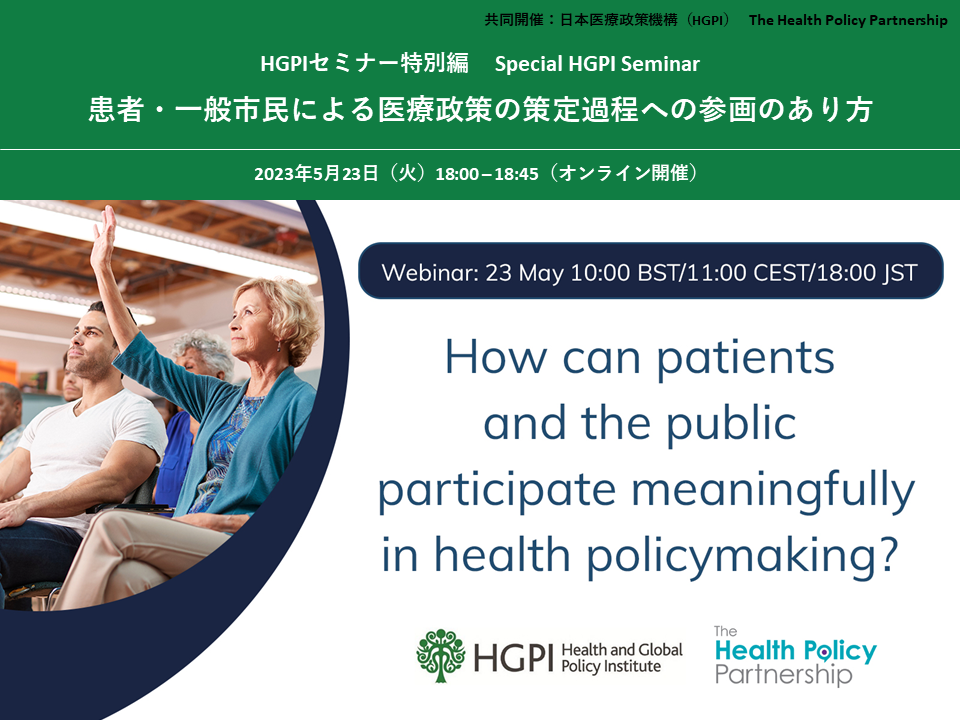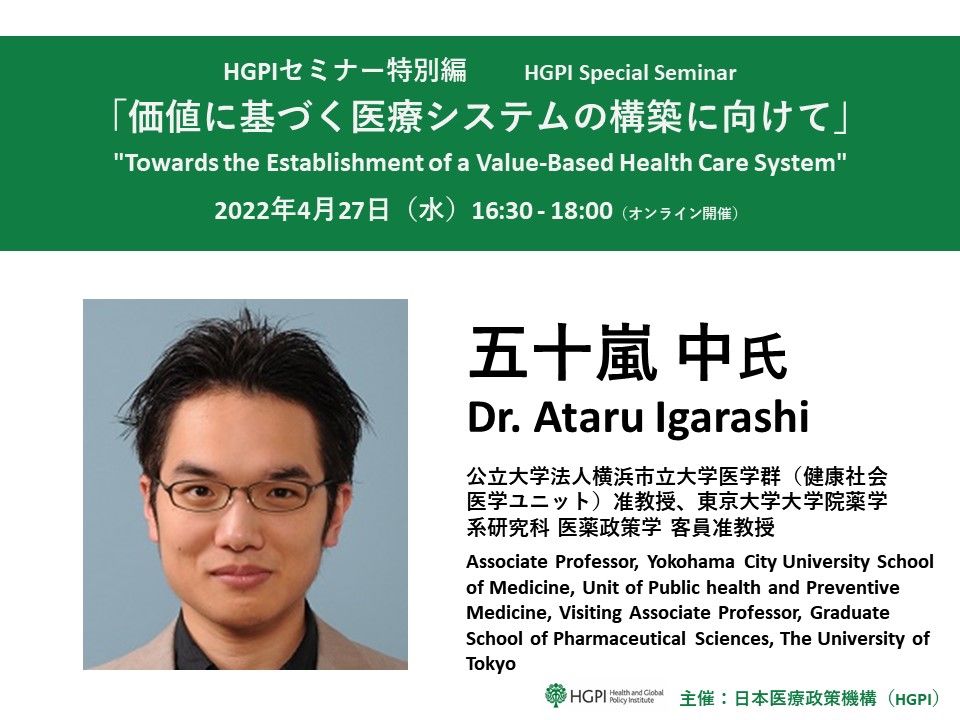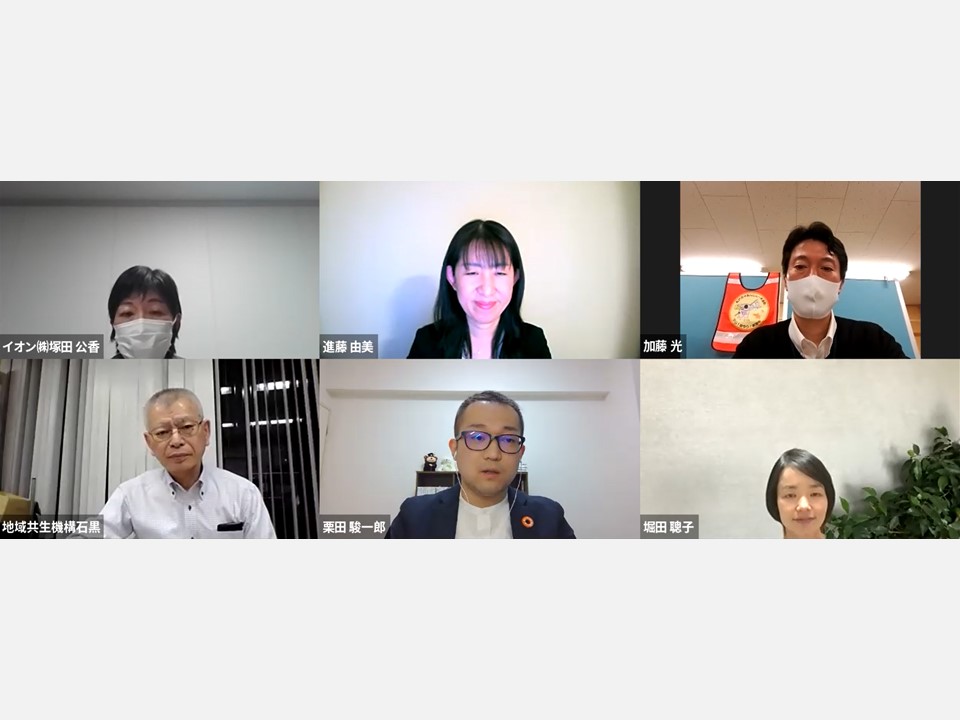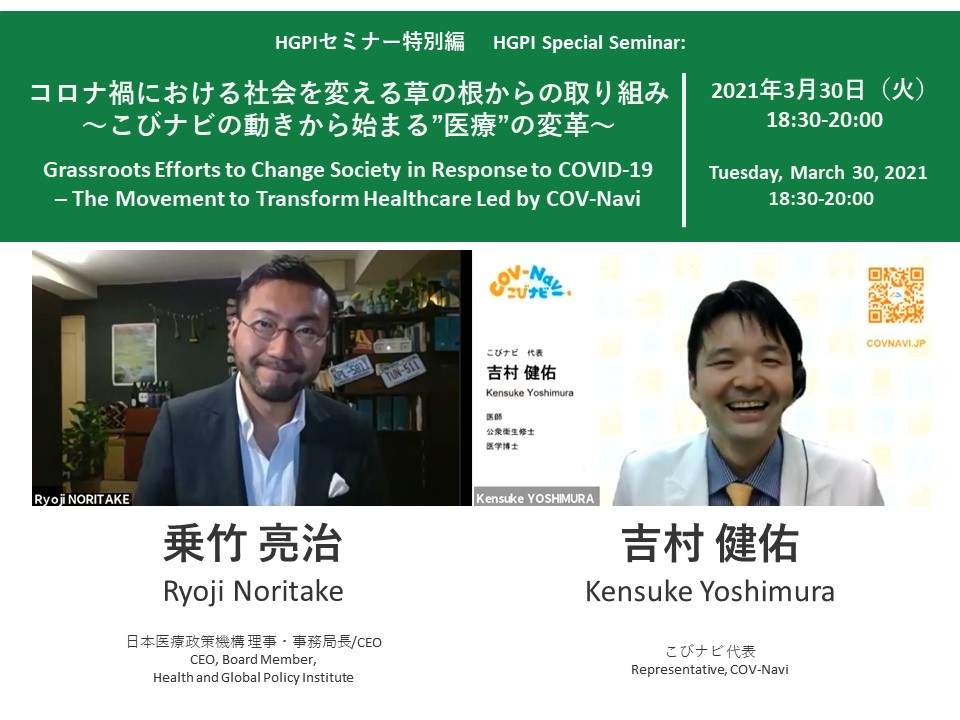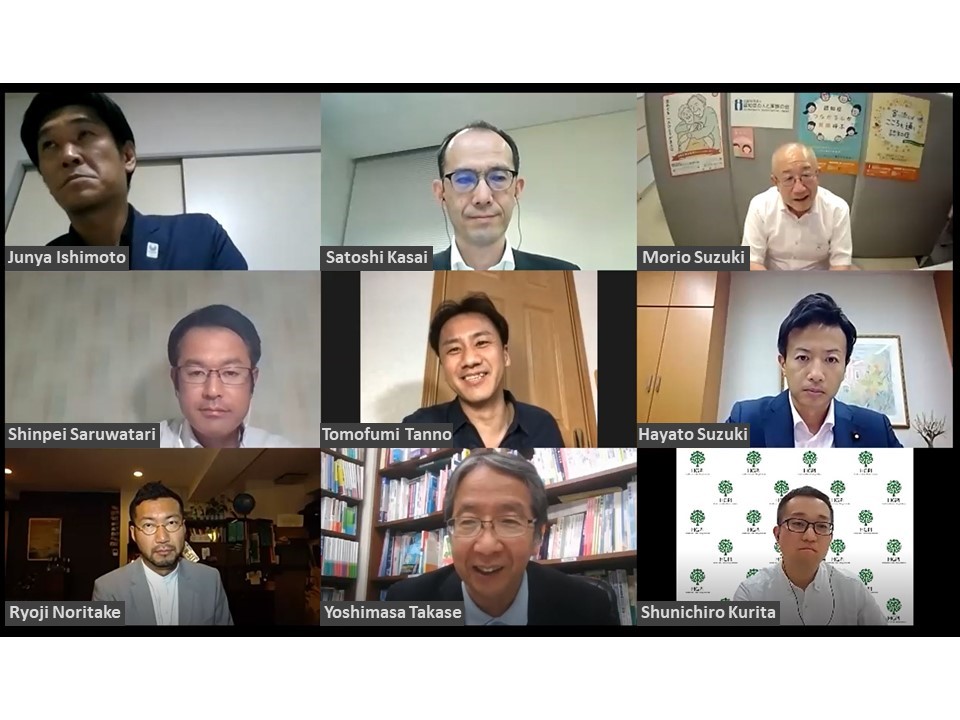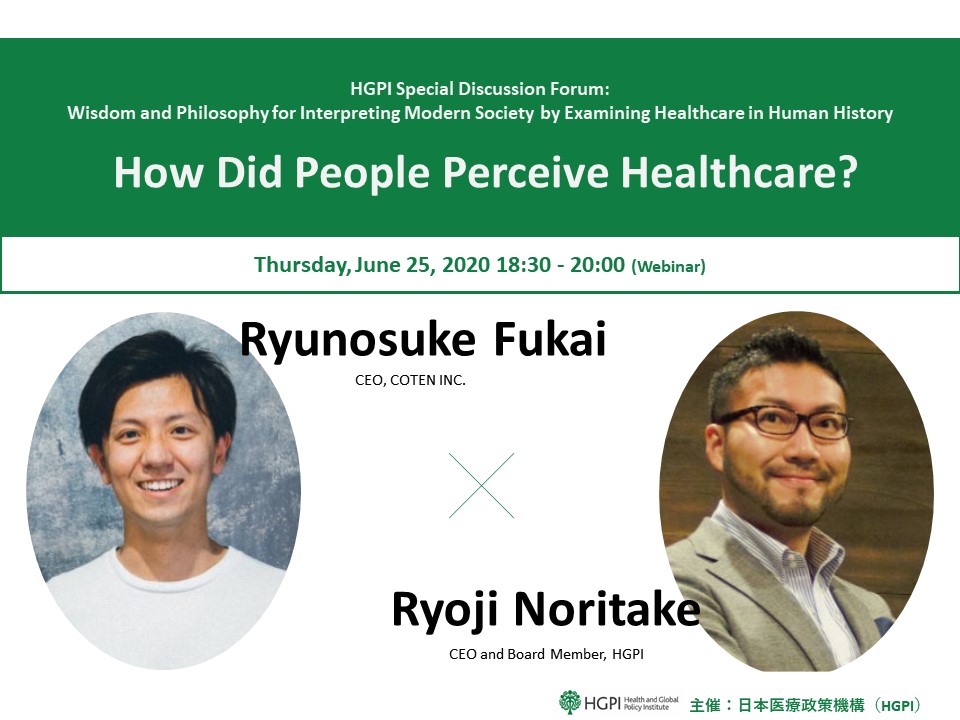[Event Report] HGPI Special Seminar – A Special Dialogue “Reinforcing Public Trust in the Health System through Healthcare DX” (August 1, 2023)
date : 10/24/2023
Tags: Future of the Health Care System, Healthcare DX, HGPI Seminar, Innovation and Sustainability
![[Event Report] HGPI Special Seminar – A Special Dialogue “Reinforcing Public Trust in the Health System through Healthcare DX” (August 1, 2023)](https://hgpi.org/en/wp-content/uploads/sites/2/shs-20230801-top_JPNENG-1.png)
This HGPI Special Seminar was held using a conversational format and feature Professor Takanori Fujita and Professor Yusuke Tsugawa. In addition to serving as Research Fellow at HGPI, Project Associate Professor Fujita serves as Department of Health Policy and Management, School of Medicine, Keio University. Professor Tsugawa serves as a Board Member at HGPI, as Associate Professor of Medicine at the Division of General Internal Medicine and Health Services Research at UCLA David Geffen School of Medicine, and as Associate Professor of Health Policy and Management at UCLA Fielding School of Public Health.
We deepened discussions on how items such as privacy, individual human rights, the interests of data collection agencies, and public interest or the needs of society as a whole relate to discussions on healthcare DX as well as examine conversations that must be held and issues that must be overcome to build a sustainable, trustworthy health system in the future.
Key Points of the Discussion
- To what extent can anonymized/pseudonymized data be used without individual consent?
- What is the approach to prevent data leakage, which is a risk when handling data, while simplifying the use of data?
- From on-site to VPN (Virtual Private Network) data handling for improved convenience.
- How to maintain a balance between the protection of personal information and the medical information that can greatly benefit from research because it is precise information.
- What is the dialogue with the public on the benefits of Healthcare DX, including the demerits?
- Is health information attributed to the government? Hospitals? Or individuals?
- Fear for the individual and effects on the population of disclosing and sharing health information.
- Who and how will the infrastructure be developed for acquiring valuable information?
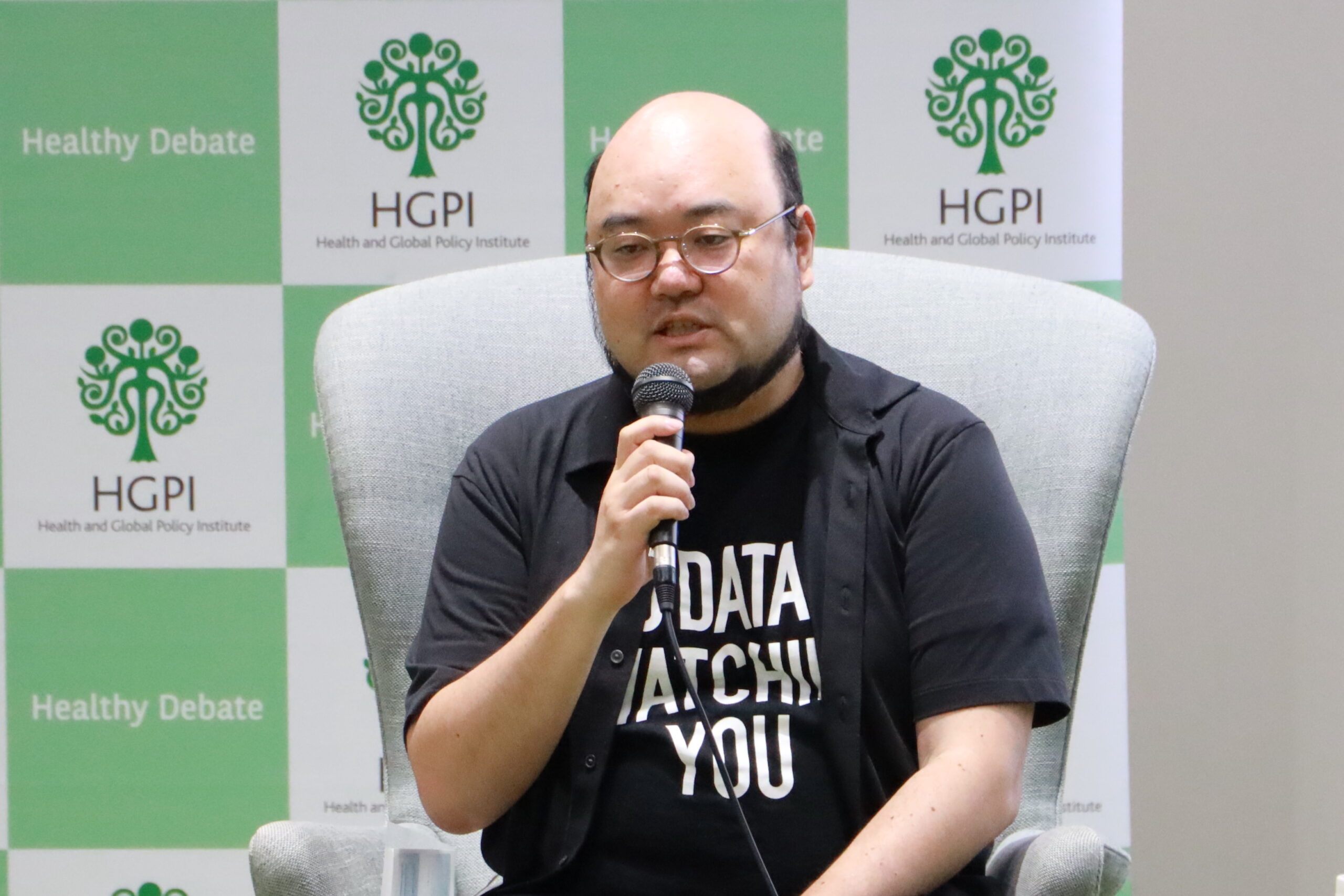 Takanori Fujita (Research Fellow, HGPI; Project Associate Professor, School of Health Innovation, Kanagawa University of Human Services; Project Associate Professor, Department of Health Policy and Management, School of Medicine, Keio University)
Takanori Fujita (Research Fellow, HGPI; Project Associate Professor, School of Health Innovation, Kanagawa University of Human Services; Project Associate Professor, Department of Health Policy and Management, School of Medicine, Keio University)
Issues of Healthcare DX in Japan
There are three major issues for “Healthcare DX” in Japan. They are “uncertainty of benefits,” “falling behind global counterparts,” and “lack of a sustainable system”.
Uncertainty of benefits
In October 2022, the Headquarters for Medical Digital Transformation (DX) Promotion was established by Prime Minister Kishida, and in June 2023, a process chart was released, mapping out the way forward for Healthcare DX in Japan. The plan includes initiatives related to the My Number Card, mainly to establish a nationwide platform for sharing health information, to standardize electronic medical records, and to revise medical service reimbursements through DX.
Additionally, the government presented a visual introducing the benefits of Healthcare DX for each life stage, from infancy to adolescence, and from adulthood to old age. The visual described specific benefits such as the ability to receive prescriptions electronically and the ability to receive medical care and medication instructions online.
However, it’s worth noting that these particular advantages are not widely promoted. For individuals who typically don’t frequent healthcare facilities, comprehending the advantages of the “convenience in visit behavior” can be challenging, leading to a prevailing perception of “unclear utility.” Furthermore, the My Number Card, a crucial element in Healthcare DX, hasn’t garnered a favorable reputation and has yet to be fully highlighted for its benefits.
In addressing these issues there is a need to focus on showcasing tangible advantages, while simultaneously vocalizing a forward-looking vision to engage citizens. Digital technology’s advantage lies in its capacity for seamless software updates, even in the face of setbacks. It is equally crucial for society to foster an environment that welcomes iterative trial-and-error processes to enhance the overall Healthcare DX.
Falling behind global counterparts
Current State in Japan
Everyone feels that Japan is lagging in digitalization, and not only in healthcare. For example, the International Institute for Management Development (IMD) ranked Japan 29th out of 63 countries in its 2022 Global Digital Competitiveness Ranking (the lowest in terms of data utilization). In addition, the penetration rate of electronic medical records is only about 50% for general clinics and general hospitals with less than 200 beds. Furthermore, although online medical care is gaining recognition, it is not yet widespread, and the COVID-19 epidemic caused confusion both in the field and among the citizens due to the rapid introduction of digital technologies mixed with analog counterparts.
Examples of EU Countries
Referring to data utilization in the European Union (EU) as an overseas example, the European Health and Digital Executive Agency (HaDEA) was established in 2021 to develop the European Health Data Space (EHDS) and related European Data Governance Law, and, to promote primary and secondary use of data within the EU and across its borders. In France, My Health Space, a database that allows citizens to access their own health information, has been established, and it is becoming commonplace for citizens to be able to access their own health information proactively.
However, the EU has been originally regarded as a difficult place for digital transformation (DX) due to its strict privacy policy and many rules and restrictions on data utilization. The pandemic of COVID-19 was an opportunity for such regions to rapidly develop laws for data utilization based on the foundation of data protection.
In the future, the EU is proposing to create separate rules for primary and secondary use, to allow data use for medical purposes without consent, and so on, in order to make data use smoother. In this way, it can be said that the EU is advancing DX in a multifaceted way by presenting laws based on objectives and principles.
Japan’s Position in the Global World
Given these factors, one gets the impression that in Japan, first and foremost, the Personal Information Protection Act is a stumbling block. In fact, the Office for the Promotion of Regulatory Reform has issued a report and there has been some discussion on the revision of the law, including the revision of the Next Generation Medical Infrastructure Act in 2023, including the direction of data utilization rules, such as speeding up and facilitating the use of data. However, Japan has been trying to proceed with many cases of data utilization, including COVID-19 measures, without developing laws, which is a major problem.
In addition, speaking of the near future, it is important to develop proactive legislation so that health care can be handled within the latest technologies such as generative AI and the metaverse.
Former Japanese Prime Minister, Shinzo Abe advocated for “Data Free Flow with Trust (DFFT)” at the 2019 Davos Forum and attempted to create an international framework that would facilitate data technology. We believe that Japan’s leadership in data utilization internationally and keeping up with the DFFT concept in the healthcare domain will be key to promoting Healthcare DX in Japan.
Lack of a sustainable system
While it is necessary to clearly state the philosophy of Healthcare DX and what it should do, it is also important to consider the feasibility and sustainability of financial resources, business models, and human resources to make it happen. In order to build a “nationwide platform for sharing health information,” as indicated in the current roadmap, the following are important to ensure that the system is sustainable.
Use of Regional Healthcare Coordination Network Case Studies
There are many cases of failures and successes in Regional Healthcare Collaboration Networks. For example, “Ajisai Net” in Nagasaki is a good case of collaboration by considering how this can be utilized in a national medical information platform. It could serve as motivation for the creators as a good case to move on to the next stage and presented as a policy recommendation.
Collaboration and cooperation with other sectors and expansion of medical concepts
Concerning DX, the private sector holds a technological edge. While a government framework exists for Healthcare DX, realizing a Healthcare DX that genuinely benefits the public can be achieved by harnessing the strengths of private enterprises and fostering collaboration with them. Additionally, while Japanese healthcare often operates within insurance frameworks, it’s crucial to recognize and promote well-being in a comprehensive manner, encompassing care beyond the scope of insurance coverage.
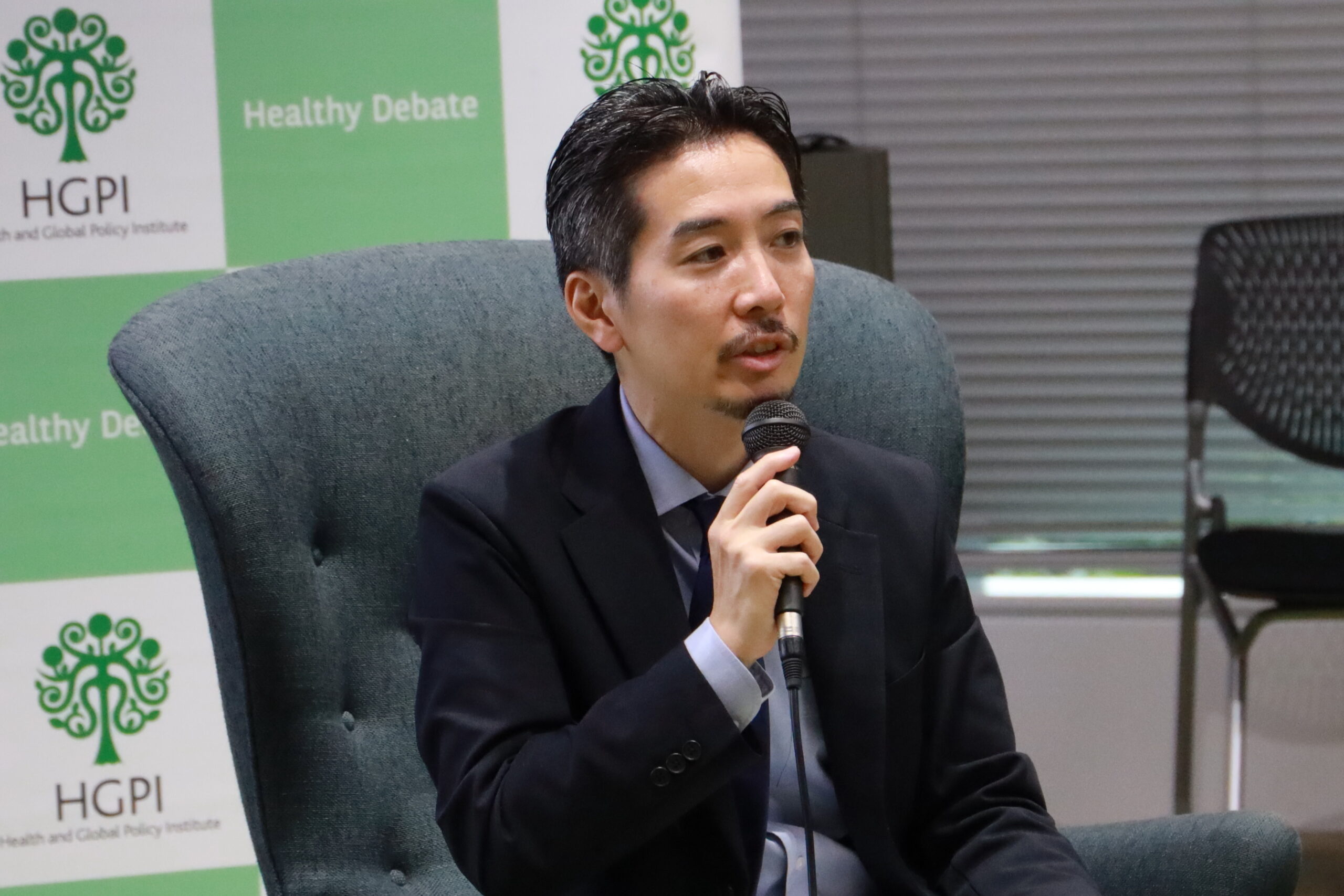
Yusuke Tsugawa (Board Member, HGPI; Associate Professor of Medicine, Division of General Internal Medicine and Health Services Research, David Geffen School of Medicine, UCLA; Associate Professor, Health Policy and Management, Fielding School of Public Health, UCLA)
DXs spread by individually assigned personal identification number, while a sense of distrust is created.
In Japan, the first topic of discussion concerning digitization is “My Number,” but in the U.S. as well, there is a personal identification number, which is used to recognize all individuals. In the U.S., personal identification numbers are managed at the administrative level, but many private companies can utilize them. In Japan, the number of organizations and private companies that can use this “My Number” is limited, and security is higher in Japan.
Each type of service is managed by its own unique number issued to customers, however, at the administrative level, these service numbers are linked to personal identification numbers. If we take this as an example in the field of health care, insurer numbers and medical examination tickets at each hospital are assigned their own numbers, but it means that these numbers and personal identification numbers can be linked behind the scenes. This means that, although information can only be confirmed within the scope of the service, when taken as an individual, the data is linked behind the scenes, even if the individual has received services from a different entity. The data can then be linked to the individual’s personal identification number, making it possible to view each piece of data as consolidated information.
This consolidation of information collected in different places produces significant benefits to the individual, though in Japan, the final step in this process is to manually identify the information, which can lead to mistakes and expose privacy, causing many people to distrust the system.
The cause of distrust is precisely where the life experience of DX is changing dramatically. Although many mistakes related to personal information still occur in the current situation, they are not visible during change. This can be explained by “status quo bias,” the illusion that nothing bad is happening because there is no change. Unless people become more tolerant of the mistakes that occur as a result of change, major changes in Healthcare DX will not progress.
Data Utilization in the U.S.
The premise is that the U.S. does not have a universal health insurance system like Japan, but is characterized by a variety of insurances and data for each insurer. There are also receipt data that have been collected from these multiple insurance databases to create a common database. Furthermore, healthcare information on various people is stored in many types of databases, including databases owned by private companies, databases open to the public for research purposes, and databases used for business purposes.
As mentioned above, some of the data can be connected behind the scenes with personal identification numbers by cooperating with government agencies, and in some cases, information outside of the database being investigated can be extracted by requesting it from the government. By combining various data, it is possible to see the whole picture, and personal identification numbers play an important role in this regard.
On the other hand, there is a concern that individuals may be identified if that much information is collected. However, the information has already been anonymized, and the database itself is independent, so that it cannot be re-identified. This allows data users to use the data only for their own primary purposes while protecting personal information. Data for research purposes, for example, will not contain personal identification numbers.
Current Status and Issues of Healthcare DX in Japan
The current status of data utilization in Japan is that insurance coverage changes with age and that medical care and long-term care cannot be linked, both of which are issues related to the infrastructure for data utilization. As mentioned above, if there is a personal identification number, it can be used as the core number for linking various service numbers. However, in Japan, both the development of personal identification numbers and their linkage to various services are lacking, making smooth and flexible use of data still difficult.
In addition, another issue is the broad scope of the Personal Information Protection Act. In the U.S., the Personal Information Protection Act only covers patients and does not cover medical institutions. However, in Japan, it is unclear what information is protected by the Personal Information Protection Act, and the value of data is often lost as a result of the law’s exclusion of any information that could be used to identify individuals, whether for commercial or research purposes.
As described above, Japan’s Healthcare DX system still has several issues to be solved, including the issue of the infrastructure of “My Number”, the mechanism to link them, and the protection of personal information for the utilization of the connected system. I hope to discuss these issues with Mr. Fujita in the next session.
Discussions
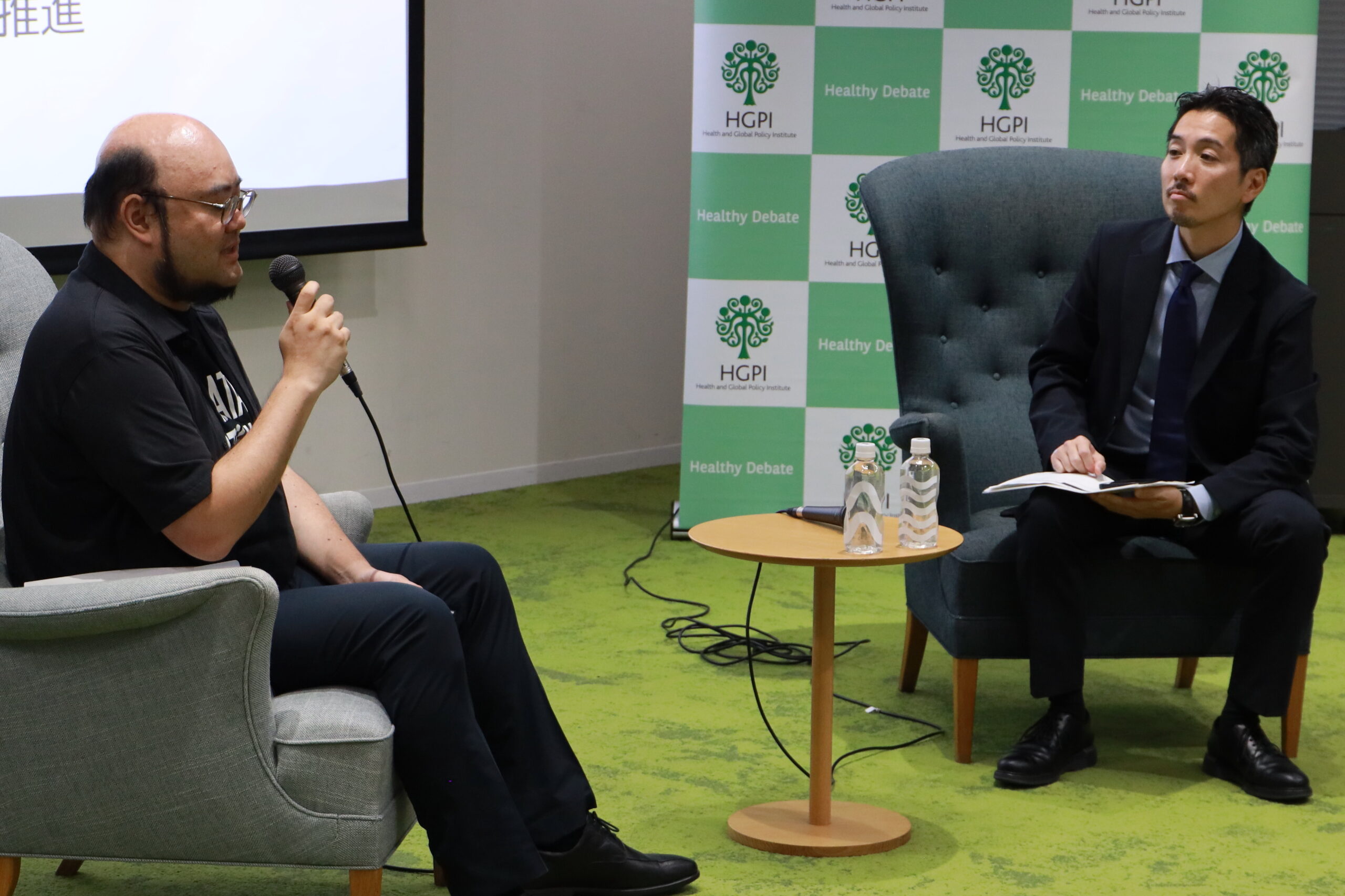
To what extent can anonymized/pseudonymized data be used without individual consent?
- In Japan, it is often suggested that everyone should opt-in “just in case”. This situation of obtaining the consent of even those who do not need it, and even those who do not need the content of such consent, is very costly. For example, when a company uses personal information data, because it is necessary to obtain the consent of each individual, this situation makes it difficult to innovate.
- The basic rule under the Personal Information Protection Act in Japan is to obtain consent at the time of acquisition of Special Care-Required Personal Information. Most medical information is Special Care-Required Personal Information and is used on an opt-in basis. However, it is impractical to obtain all consent explicitly in person, and the reality is that for most information use, implicit consent is obtained by posting information use notices at the hospital counter or on the website. Some people argue that this situation does not constitute explicit consent, and this has led to a situation in which all documents are signed repeatedly as a “just-in-case” precaution.
- Concerning the use of data under the Next Generation Medical Infrastructure Act, opting out after giving notice is permitted, but in any case, it is too much work, so the Regulatory Reform Council is discussing simplifying consent. There are still many issues to be addressed when it comes to anonymization, pseudonymization, and the surrounding organization.
What is the approach to prevent data leakage, which is a risk when handling data, while simplifying the use of data?
- A start-up company in the U.S. considers that the main issue related to the use of medical information is to take the information out of the hospital, and has introduced a system in which data collection and analysis are completed within the hospital, and only the analysis results or algorithms are sent out of the hospital. In this way, the U.S. is considering and implementing a system that clearly distinguishes the line between the two and prevents problems from occurring.
- At the World Economic Forum, there was a discussion on whether it would be a good idea to make it possible to take out only the necessary final results without releasing the data to the outside, and to establish a system that would allow access without the individual consent of the person concerned. The researchers also expressed the opinion that carrying data around is risky and they would like to refrain from doing so, and I think this would be a good system for both sides if realized.
- Currently, Japan’s National Database (NDB) is moving in the above direction by developing a system that allows data to be analyzed on-site. However, some argue that it is not convenient for the analysis to be limited to the place where in-hospital data is stored, and this has not been followed up to the point of creating legal rules.
From on-site to VPN (Virtual Private Network) data handling for improved convenience
- Taking Medicare in the U.S. as an example, the era of receiving data through hard drives containing anonymized information has changed to an era in which people can access the data themselves simply by receiving VPN access rights. In this case, when the desired information is selected, it is checked by the administrator to ensure that there is no risk of leakage, and security is ensured by creating a state where data diversion does not occur. As in the past, it is also possible to obtain information onsite, with a complete security system in place.
- In Japan, there is a trend toward anonymizing all digital information for distribution, which has already created a sense that if the information is anonymized, there will be no problems. However, if healthcare information is anonymized to the point where individuals cannot be identified, much of the data becomes useless. Therefore, we believe that it is necessary to have a system that at least allows us to follow the person under a pseudonym or sometimes even under a real name, and to intervene with the person as necessary depending on the results of the analysis, but we have yet to establish rules for that as well.
How to maintain a balance between the protection of personal information and the medical information that can greatly benefit from research because it is precise information.
- The world of data is fundamentally a cat and mouse game. Whenever information is protected, not only in the medical field, technologies to break them emerge, and we try to create a protection system that surpasses them. Therefore, it is essential to establish rules that should be prohibited even if they can be re-identified, while providing penalties through laws and other means. At the same time, the issue of trust in data users is also significant. Researchers acquire and analyze data for research purposes. It is assumed that the purpose is not to look into the privacy of patients, but to generate information that will benefit the world. However, if something were to happen to lose that trust, the public would become distrustful of DX, and strict rules and systems would be introduced for its use.
- On the other hand, trust is an intangible concept and has no reality. It is desirable to have safeguards such as legally binding force and penalties. In the case of the COVID-19 pandemic, for example, there were regions in other countries that created new laws and implemented measures to combat COVID-19 based on those laws. In the case of Japan, there are still insufficient measures to prevent COVID-19 outbreaks. By contrast, in the case of Japan, it seems that the Japanese people barely survived the COVID-19 pandemic due to notification and peer pressure, and I believe that this unique Japanese national character is one of the reasons for the difficulty in balancing the fields of personal information protection and innovation using information.
What is the dialogue with the public on the benefits of Healthcare DX, including the demerits?
- Leakage of personal information often occurs in everyday life. When we search the Internet, purchase something, or download an app, our personal information is often leaked, and we are often notified of our consent to such leaks, and the public checks the “consent” box. I think the main reason people accept it for this is that the service is convenient and attractive. Although there may be some risk, I think it is because the advantages that appeal to the service provider, such as the convenience of not needing to log in next time or the benefits that come with the service, outweigh the risk of providing personal information on the consumer’s side. In the case of Healthcare DX, there are concerns about information leakage, and unless the convenience and attractiveness to the public can be seen beyond that, it will be difficult for the system to spread.
- Currently, there are many benefits in Healthcare DX, and understanding will improve if these benefits are made known to the citizens. For example, in the case of the My Number Card, there were a certain number of people who were attracted by the easy-to-understand benefits, such as the distribution of support benefits for the restriction leave to be taken under the COVID-19 outbreak, and the acquisition of vaccination certificates. However, the reason why it may be difficult to show benefits in the health care sector is that many citizens believe they are healthy and that medical care is not relevant. For such people, medical visits and hospital visits are not routine, and it is difficult for them to perceive the simplification of visit behavior, medical care coordination, and digitization of prescriptions and medical certificates alone as benefits.
Is health information attributed to the government? Hospitals? Or individuals?
- As for money, if you go to your main bank, your personal account balance and transaction status are all managed at once. However, when it comes to health information, no one hospital or government agency has all the information. In other words, no one manages the entirety of an individual’s health and medical information.
- Discussions often arise as to who should have possession of an individual’s set of medical information. Is it the patient themself, the medical institution, or the government? In many countries, it is in the patient’s possession, but the problem is that the patient does not have the resources to manage it. Individuals have limitations in managing, operating, etc., the enormous amount of data. In other countries, for example, there are discussions about private services managing the data on behalf of the patient.
- Medical records are the primary source of medical information, but in Japan there is a sense that medical records are records that are kept privately by medical professionals. On the other hand, there is also a strong opinion that the information belongs to the individual patient, which has caused controversy. In some cases, such as in Scandinavia, the national government centrally manages medical records. However, data, unlike tangible objects, can be shared and copied, and therefore, it may be acceptable to divide the data into three parts: the part owned by the patient, the part owned by the doctor, and the part managed by the government. Essentially, what is important is not who owns the data, but rather what benefits can be derived from its use.
- In Japan, the basic system of medical care is the universal health insurance system, which is a system built on the foundation of national health insurance. The system is administered by local governments, which are administrative agencies, and there is no doubt that the national government needs to manage the system. The ideal situation would be for patients, medical institutions, and the national government to each own the data, and for the information to be utilized in an appropriate manner where necessary.
- In the U.S., there is a law that allows patients to have direct access to their own medical records. In Japan, the Personal Information Protection Act requires medical institutions to disclose medical records when requested to do so by patients, but the law does not allow patients to directly access their own medical records online or through other means, as is the case in the U.S. Direct access to medical records would be beneficial in that it would allow patients to calmly review their doctors’ explanations at home after a hospital visit, and it would also allow them to reaffirm their own medical conditions and personalize their health status.
- In the preparation stage of this system, there were concerns that it might lead to a deterioration of the relationship between the medical staff and patients and patient anxiety, for example, by exposing a lack of explanation on the part of the medical staff and making it difficult to interpret the contents of the system. However, once the system was implemented, it was well received not only by patients but also by the medical staff, and has led to the improvement of health literacy.
Fear for the individual and effects on the population of disclosing and sharing health information.
- As in the discussion that is occurring with the My Number Card, those who fear the leakage of personal information do not necessarily have health information that they do not want to be known, but they may often have a vague fear that the information may be misused. For example, in the case of rare diseases, because of the rarity of the experience, a certain number of people are willing to provide data if it can be used to help others with the same disease. In fact, in the U.S., there is a place where patients with rare diseases can create a community and share their real-life experiences with treatment. Rare diseases have few effective drugs, and information in the community can be helpful not only to patients but also to medical professionals. This is like information sharing on a so-called social networking service, but if the information is accumulated as a database and further used in research and development, medical care, and drug development, it will eventually be useful to many people.
Who and how will the infrastructure be developed for acquiring valuable information?
- Recently, the boundary between health and medical care is blurring as more and more health information is being obtained through wearable devices and healthcare apps, even in everyday life. In the U.S., private platform companies and hospitals are collaborating to increase the number of wearable devices and apps in use. In Japan, there is an urgent need to develop a digital infrastructure for Healthcare DX. The question is who will develop and manage this infrastructure. In Europe, the national government is taking the lead in developing and managing the infrastructure, and the EHDS is creating a common platform for the entire EU. In the U.S., each insurer is creating a private-sector-led platform. The private sector has the technology and know-how and is more sustainable both financially and systemically.
- There is also the issue of securing financial resources. The national budget for research is only for the “research” itself, and often does not cover follow-up activities such as the use of research results. This raises the opinion that this is not a sustainable system. Ideally, the national government would provide financial support for medical research, including the management and operation of the obtained data, but due to the background situation of suppressed medical costs, it is difficult to invest in research, and a rational system has not yet been established.
- There are two main funding streams related to health care in Japan. One is the field under the jurisdiction of the Ministry of Education, Culture, Sports, Science and Technology (MEXT) and used for research purposes, and the other is the field of medical expenses under the jurisdiction of the Ministry of Health, Labour and Welfare (MHLW) and operated as universal health insurance. Even if the data used are the same, the researchers and users are under different jurisdictions, and thus each is considered separately in Japan. Unless a stance is formed throughout Japan to bridge this gap and invest in research to reduce medical costs, it is my impression that it will be difficult to create an effective system for Healthcare DX.
- In the U.S., research is funded by the National Institutes of Health (NIH), a national agency. Instead of just spending, the government assumes that the research funded by this expense will be returned to the country, as it will later result in turning the health care economy around.
[Event Overview]
- Speakers:
Takanori Fujita (Research Fellow, HGPI; Project Associate Professor, School of Health Innovation, Kanagawa University of Human Services; Project Associate Professor, Department of Health Policy and Management, School of Medicine, Keio University)
Yusuke Tsugawa (Board Member, HGPI; Associate Professor of Medicine, Division of General Internal Medicine and Health Services Research, David Geffen School of Medicine, UCLA; Associate Professor, Health Policy and Management, Fielding School of Public Health, UCLA)
- Date & Time: Tuesday, August 1, 2023; from 13:00 to 14:30 JST
- Format: In-person
- Language: Japanese
- Venue: Global Business Hub Tokyo, Grand Cube 3F, Otemachi Financial City, 1-9-2, Otemachi, Chiyoda-ku, Tokyo
- Participation fee: Free
- Capacity: 100
■ Profile:
 Takanori Fujita
Takanori Fujita
Professor Takanori Fujita is a graduate of the University of Tokyo Graduate School of Medicine and Faculty of Medicine and the University of Tokyo Faculty of Law Graduate Schools for Law and Politics. After serving as Endowed Associate Professor at Nagoya University Graduate School/School of Economics, Project Lead of the Healthcare Data Project at the World Economic Forum Centre for the Fourth Industrial Revolution Japan, he was appointed Project Associate Professor at the Keio University School of Medicine Department of Health Policy and Management in 2021 and Project Associate Professor at Kanagawa University of Human Services of School of health Innovation in 2023. He specializes in medical jurisprudence and health policy. He also serves as a member of the Cabinet Secretariat Expert Panel on the COVID-19 Contact Confirming Application (COCOA) and as a member of the Japanese Orthopaedic Association Ethics Committee.
His main published works include “Dementia and Information” by co-author (Published October, 2020 by the Keiso Shobo), ”Medical AI of Next Generation: Integrating with AI via Biological Signals” by co-author (Takanori Fujita et.al,.) (Published July 2, 2017 by the CORONA PUBLISHING).
 Yusuke Tsugawa
Yusuke Tsugawa
Yusuke Tsugawa, MD, MPH, PhD is Associate Professor of Medicine and Health Policy and Management at UCLA. Prior to joining the faculty at UCLA, he was a health specialist at the World Bank group and a research fellow at Beth Israel Deaconess Medical Center/Harvard Medical School. Dr. Tsugawa’s research has been published in leading medical and health policy journals including JAMA, JAMA Internal Medicine, BMJ, and Lancet. Dr. Tsugawa’s research has also been featured in several media outlets including The New York Times, The Washington Post, and National Public Radio. Dr. Tsugawa received PhD in Health Policy from Harvard University, MPH from Harvard School of Public Health, and MD from Tohoku University School of Medicine in Japan. His research is supported by grants from the National Institute on Aging (NIA) and the National Institute on Minority Health and Health Disparities (NIMHD). He is an author of multiple books including “Causal Inference in Economics” (with Professor Makiko Nakamuro, published by DIAMOND, Inc.) and “Introduction to Health Policy” (Igaku-Shoin, Ltd.). He is an expert in health policy and health economics.
Top Research & Recommendations Posts
- [Policy Recommendations] Achieving a Sustainable Society of Health and Longevity Through the Integration of Environment and Healthcare-Incorporating a Planetary Health Perspective into the 3rd Phase of The Healthcare Policy-(December 20, 2024)
- [Policy Recommendations] Integrating Climate and Health for a Sustainable Society: Incorporating a Planetary Health Perspective into Nationally Determined Contributions (NDCs)(December 9, 2024)
- [Research Report] Building a Mental Health Program for Children and Measuring its Effectiveness (June 16, 2022)
- [Policy Recommendations] Developing a National Health and Climate Strategy for Japan (June 26, 2024)
- [Policy Recommendations] Policy Recommendations on Strengthening CKD Strategies for Workers: The Importance of Providing Early Detection, Intervention, and Support Through Screenings and Medical Visits (October 28, 2024)
- [Research Report] The 2023 Public Opinion Survey on Satisfaction in Healthcare in Japan and Healthcare Applications of Generative AI (January 11, 2024)
- [Event Report] Planetary Health Expert Meeting Aiming for Sustainable Healthcare: Learning from the Impact of Environmental Pollution and Medical Waste During the Pandemic (February 16, 2024)
- [Policy Recommendations] Obesity Control Promotion Project 2023 “The Next Steps for Engaging and Cooperating with Patients, Citizens, and Communities for Implements of Obesity Control Measurements” (April 8, 2024)
- [Announcement] A Turning Point Towards Building Green Healthcare Systems (June 5, 2024)
- [Research Report] Survey of Japanese Physicians Regarding Climate Change and Health (December 3, 2023)
Featured Posts
-
2024-11-25
[Registration Open] (Webinar) The 130th HGPI Seminar “Marking a Decade of the Act on Medical Care for Patients With Intractable Diseases: Connecting Intractable Diseases and Society From the Perspective of a Media Professional and Family Member” (January 28, 2025)
![[Registration Open] (Webinar) The 130th HGPI Seminar “Marking a Decade of the Act on Medical Care for Patients With Intractable Diseases: Connecting Intractable Diseases and Society From the Perspective of a Media Professional and Family Member” (January 28, 2025)](https://hgpi.org/en/wp-content/uploads/sites/2/hs130-top_JPNENG-1.png)
-
2024-12-18
[Policy Recommendations] Policy Recommendations on Strengthening CKD Strategies for Workers: The Importance of Providing Early Detection, Intervention, and Support Through Screenings and Medical Visits (October 28, 2024)
![[Policy Recommendations] Policy Recommendations on Strengthening CKD Strategies for Workers: The Importance of Providing Early Detection, Intervention, and Support Through Screenings and Medical Visits (October 28, 2024)](https://hgpi.org/en/wp-content/uploads/sites/2/HGPI_20241023_FY2024CKD_eyecatch.jpg)
-
2024-12-20
[Policy Recommendations] Achieving a Sustainable Society of Health and Longevity Through the Integration of Environment and Healthcare-Incorporating a Planetary Health Perspective into the 3rd Phase of The Healthcare Policy-(December 20, 2024)
![[Policy Recommendations] Achieving a Sustainable Society of Health and Longevity Through the Integration of Environment and Healthcare-Incorporating a Planetary Health Perspective into the 3rd Phase of The Healthcare Policy-(December 20, 2024)](https://hgpi.org/en/wp-content/uploads/sites/2/e8a714648913193b03d5b6ede38c161e.png)
-
2024-12-25
[Registration Open] (Hybrid Format) Expert Meeting “Innovations Required to Achieve Precision Psychiatry” (January 22, 2025)
![[Registration Open] (Hybrid Format) Expert Meeting “Innovations Required to Achieve Precision Psychiatry” (January 22, 2025)](https://hgpi.org/en/wp-content/uploads/sites/2/mh-20250122-topr-1.png)
-
2024-12-27
[Activity Report] Second UN General Assembly High-Level Meeting on AMR (September 26, 2024)
![[Activity Report] Second UN General Assembly High-Level Meeting on AMR (September 26, 2024)](https://hgpi.org/en/wp-content/uploads/sites/2/4ED86AF7-49DE-465D-B59D-843B4F3C6102_1_201_a-scaled-1.jpeg)




